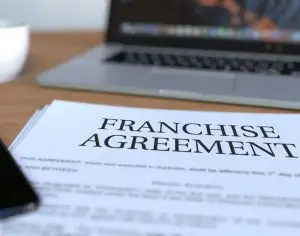Franchising is a business model that has shown itself to be resilient to periods of economic contraction. A shrinking economy is likely to lead to fewer employment opportunities and make franchising a more appealing alternative, and lenders are more likely to lend in favour of a tried and tested franchise than an unproven brand. Despite the temptation to view franchising as an easy route to becoming a business owner, lack of planning and carrying out thorough legal due diligence can mean that new franchisees struggle to make a success of it.
One of the key mistakes that franchisees make is failing to adequately review the franchise agreement. The agreement will set out the obligations on franchisees, which can be onerous. A common misconception is that being a franchisee means making a profit, but it’s rarely that simple. There will typically be monthly fees payable, which will include royalties, contributions to the marketing budget, as well as obligations to make minimum purchases from the franchisor and service levels to meet. The obligations will vary from franchise to franchise. Franchisors are usually very protective of their brands, and can be quite specific about how franchisees deal with complaints, for example, which is likely to be stipulated in the franchise agreement.
Franchisees may be asked to sign a personal guarantee, which may mean that they can be become personally liable in the event their company through which the franchise operates fails to perform its duties as set out in the agreement, putting their personal assets, such as any family home, at risk. It is worth instructing a specialist solicitor who can advise on the full extent of your obligations from the outset and can clarify the potential risks of the bespoke terms of the franchise agreement.
In the excitement of becoming a business owner, franchisees often overlook the need to at least consider a long-term exit strategy. From the outset, it is important to make sure that your business objectives are aligned with the franchisors. Franchisees are often locked in for at least five years and might only be allowed to sell to a third party approved by the franchisor, but some franchisors are more relaxed about this, which might be an attractive option in a recessionary environment. Taking a long-term view from the start and picking a franchise that has appropriate support for new franchisees and acceptable exit terms to ensure a smooth transition are important factors in making a success of your franchise.
When carrying out your own due diligence, consider obtaining references from other franchisees. Are there any issues other franchisees have encountered? We recently acted for a client who complained that the website and online support of the franchisor was always down, which caused problems. Another client complained that the promised marketing campaigns to which they contributed never materialised. Alongside the anecdotal, market research is invaluable. How well known is the franchise and has it a growing reputation? How is the brand perceived? You will most likely parting with significant amounts of your own money to fund the franchise, so due diligence is key.
Another aspect that is frequently overlooked, but which could be especially costly in the current environment in which multiple overlapping franchises compete for dwindling disposable income, is that of territories. Franchisees should think carefully about whether they should push for exclusivity in a particular territory and negotiate the terms on which the franchisor might have the ability to change or shrink that territory or even to compete directly with the franchisee in the territory. In benign economic circumstances exclusivity might not factor very highly but with the size of the pie shrinking, it becomes more important.
Franchising can be a great way to get a first taste of entrepreneurship. Franchisees are paying for a recognised concept, brand, and franchisor support, which often makes it less risky than running any other business. During a recession, that can be a big advantage if careful due diligence is undertaken.


































